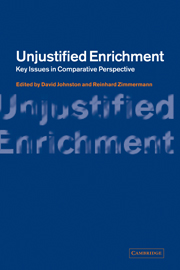Book contents
- Frontmatter
- Contents
- List of contributors
- Preface
- Table of cases
- List of abbreviations
- I Introduction
- II Enrichment ‘without legal ground’ or unjust factor approach
- III Failure of consideration
- IV Duress and fraud
- 6 In defence of unjust factors: a study of rescission for duress, fraud and exploitation
- 7 Fraud, duress and unjustified enrichment: a civil-law perspective
- V Change of position
- VI Illegality
- VII Encroachment and restitution for wrongs
- VIII Improvements
- IX Discharge of another person's debt
- X Third-party enrichment
- XI Proprietary issues
- XII Taxonomy
- Index
7 - Fraud, duress and unjustified enrichment: a civil-law perspective
Published online by Cambridge University Press: 31 July 2009
- Frontmatter
- Contents
- List of contributors
- Preface
- Table of cases
- List of abbreviations
- I Introduction
- II Enrichment ‘without legal ground’ or unjust factor approach
- III Failure of consideration
- IV Duress and fraud
- 6 In defence of unjust factors: a study of rescission for duress, fraud and exploitation
- 7 Fraud, duress and unjustified enrichment: a civil-law perspective
- V Change of position
- VI Illegality
- VII Encroachment and restitution for wrongs
- VIII Improvements
- IX Discharge of another person's debt
- X Third-party enrichment
- XI Proprietary issues
- XII Taxonomy
- Index
Summary
Introduction
Fraud and duress are the two classical improper means of influencing human conduct. When they are used to induce a person to confer a benefit on another, it is only natural to respond that the benefit, or a substitute, should be restored. The purpose of this contribution is to examine how the law of unjustified enrichment in certain civil-law systems deals with this duty to provide restitution. Particular attention will be paid to the position in German, Dutch and South African law, although comparisons will at times be made with the position in the common law. The reason for the choice of these systems is that they represent quite distinct lines of development within the civilian tradition. Both German and Dutch law show how codification impacted on the development of the civil law. In the case of German law, the recognition of a single codified general enrichment action has given rise to a complete realignment of enrichment remedies. The relevant Dutch law is also codified, but in certain respects its approach is quite different – most notably its separation of the payment that is not due from the general enrichment action and its adherence to a causal system of the transfer of ownership. It can, therefore, act as an interesting foil for German law. Finally, there is South African law, which is remarkable in that it has retained significant aspects of the relevant civil law in uncodified form.
- Type
- Chapter
- Information
- Unjustified EnrichmentKey Issues in Comparative Perspective, pp. 194 - 224Publisher: Cambridge University PressPrint publication year: 2002



